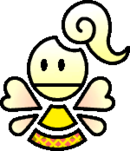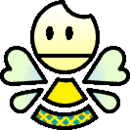Nimbi: Difference between revisions
No edit summary |
Annalisa10 (talk | contribs) |
||
| (46 intermediate revisions by 30 users not shown) | |||
| Line 1: | Line 1: | ||
{{species | {{species infobox | ||
|image=[[File: | |image=[[File:Nimbi Lady.png|130px]][[File:Nimbi Boy.png|130px]] | ||
Female (left) and male (right) Nimbis | |||
|comparable=[[Skellobit]]s<br>[[Shayde]]s | |||
|notable=[[Blubi]]<br>[[Bonechill]] (implied)<br>[[Fallbi]]<br>[[Fribi]]<br>[[Grambi]]<br>[[Janbi]]<br>[[Luvbi]] (also the white [[Pure Heart]])<br>[[Marbi]]<br>[[Maybi]]<br>[[Monbi]]<br>[[Novbi]]<br>[[Rainbi]]<br>[[Rebbi]]<br>[[Saturbi]]<br>[[Sprinbi]]<br>[[Sumbi]]<br>[[Sunbi]]<br>[[Thurbi]]<br>[[Wenbi]]<br>[[Whibbi]]<br>[[Winbi]]<br>[[Yebbi]] | |||
|first_appearance=''[[Super Paper Mario]]'' ([[List of games by date#2007|2007]]) | |first_appearance=''[[Super Paper Mario]]'' ([[List of games by date#2007|2007]]) | ||
|collapsed=true | |||
}} | }} | ||
'''Nimbis''' are the angel-like citizens of [[The Overthere]] in ''[[Super Paper Mario]]''. Their species name comes from "{{wp|nimbostratus cloud|nimbus}}", referencing their physical appearance and habitat. | |||
The Nimbis' speech is based on Elizabethan English, such as that used in the [[wikipedia:King James Bible|King James Bible]]. There are notable differences between actual Elizabethan English and the dialect the Nimbis speak. For example, the Nimbis seem to freely use "thou" (as a subject) and "thee" (as an object) in place of "you", but in Elizabeth English, "thou" and "thee" were strictly singular and informal/familiar, and were only used to address family members or friends, or people considered inferior by the speaker; rulers would take offense to being addressed with those pronouns. Furthermore, the suffix "-est" is used excessively. In proper [[wikipedia:Elizabethan era|Elizabethan era]] grammar, "-est" is the 2nd person singular familiar (therefore going with "thou") verb ending, which has no successor in Modern English, but can be likened to the "s" added in the 3rd person singular. Thus, "thou-knowest-what", as [[Fallbi]] says, is correct, but "tellest me, now, Mother," as Luvbi says, is incorrect, as a verb takes its base form when used to give a command; it would be like saying "Are there!" to mean "Be there!" | |||
In terms of appearance, most of the Nimbis look identical to each other, except that females have hairstyles and warmer colors. Many of Nimbis' names are based on days, colors, seasons, or months. | |||
{{br|left}} | |||
'''Nimbis''' are the angel-like citizens of [[The Overthere]] in ''[[Super Paper Mario]]''. The Nimbis | |||
==Names in other languages== | ==Names in other languages== | ||
{{ | {{foreign names | ||
|Jap=エルエル人 | |Jap=エルエル人 | ||
|JapR= | |JapR=Erueru Jin | ||
|JapM= | |JapM=Possibly a partial repetition of「エンジェル」(''enjeru'', angel) +「人」(''jin'', people) | ||
|Fre=Nimbi | |||
|Ita=Nimbì | |||
|SpaE=Nimbí<ref>[https://www.youtube.com/watch?v=5CXVq-GsFjk& "Super Paper Mario - El Inframundo - Cap.7 7-4 [2]"].</ref> | |||
|Kor=러브엘 | |||
|KorR=Leobeu-el | |||
|KorM=Transliteration of the Japanese name | |||
|Ger=Nimbi | |||
}} | |||
==References== | |||
<references/> | |||
{{SPM}} | {{SPM}} | ||
[[Category:Nimbis]] | [[Category:Nimbis|*]] | ||
[[Category:Super Paper Mario | [[Category:Super Paper Mario species]] | ||
Latest revision as of 10:36, October 5, 2023
| Nimbi | |||
|---|---|---|---|
 
Female (left) and male (right) Nimbis | |||
| First appearance | Super Paper Mario (2007) | ||
| |||
| |||
Nimbis are the angel-like citizens of The Overthere in Super Paper Mario. Their species name comes from "nimbus", referencing their physical appearance and habitat.
The Nimbis' speech is based on Elizabethan English, such as that used in the King James Bible. There are notable differences between actual Elizabethan English and the dialect the Nimbis speak. For example, the Nimbis seem to freely use "thou" (as a subject) and "thee" (as an object) in place of "you", but in Elizabeth English, "thou" and "thee" were strictly singular and informal/familiar, and were only used to address family members or friends, or people considered inferior by the speaker; rulers would take offense to being addressed with those pronouns. Furthermore, the suffix "-est" is used excessively. In proper Elizabethan era grammar, "-est" is the 2nd person singular familiar (therefore going with "thou") verb ending, which has no successor in Modern English, but can be likened to the "s" added in the 3rd person singular. Thus, "thou-knowest-what", as Fallbi says, is correct, but "tellest me, now, Mother," as Luvbi says, is incorrect, as a verb takes its base form when used to give a command; it would be like saying "Are there!" to mean "Be there!"
In terms of appearance, most of the Nimbis look identical to each other, except that females have hairstyles and warmer colors. Many of Nimbis' names are based on days, colors, seasons, or months.
Names in other languages[edit]
| Language | Name | Meaning |
|---|---|---|
| Japanese | エルエル人 Erueru Jin |
Possibly a partial repetition of「エンジェル」(enjeru, angel) +「人」(jin, people) |
| French | Nimbi |
- |
| German | Nimbi |
- |
| Italian | Nimbì |
- |
| Korean | 러브엘 Leobeu-el |
Transliteration of the Japanese name |
| Spanish (NOE) | Nimbí[1] |
- |